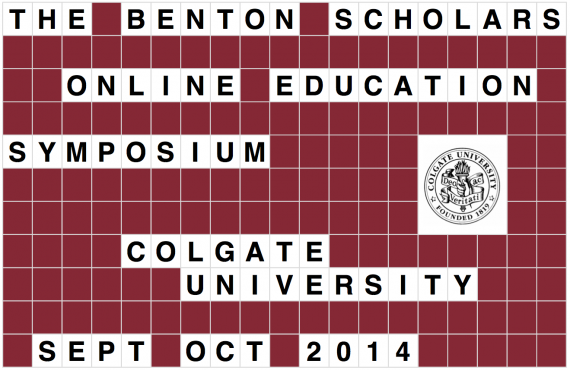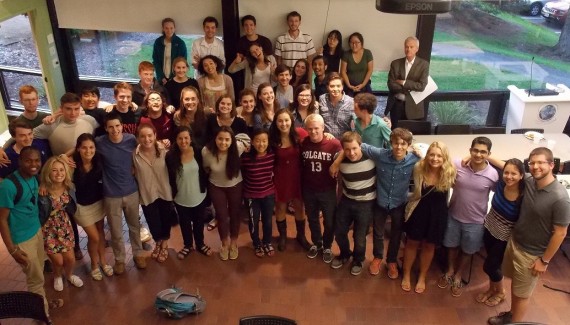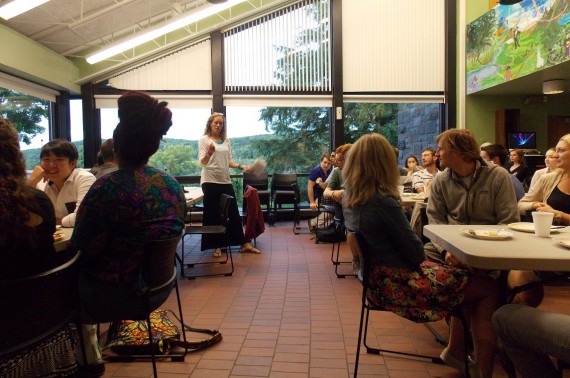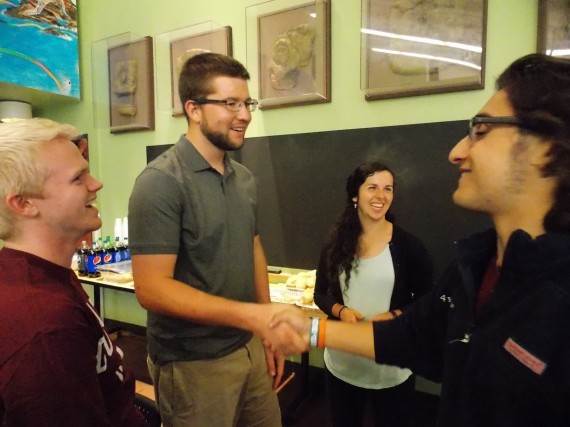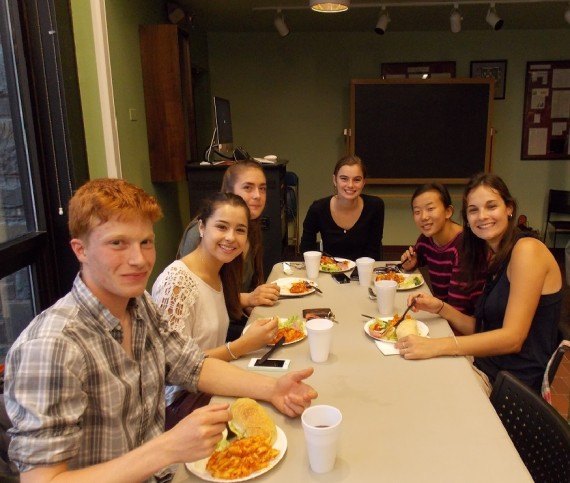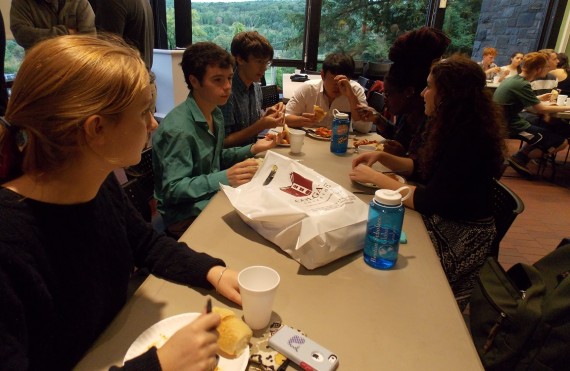A small group of Benton Scholars took MOOCs during the summer of 2014. Participation was voluntary, and no Colgate course credit was granted. After finishing, we asked each student to write a response capturing their thoughts and reactions to this experience. Selected responses are reproduced below. Please note: the opinions expressed here are those of students–not the Benton Scholars program or Colgate University more generally.
Click here to find out more about the project behind these posts. Click here to learn more about the upcoming Online Education Symposium being sponsored by the Benton Scholars program.
Sid Wadhera ‘17:
The MOOC (Massive Open Online Course) I took this summer through the World Bank, “Risk and Opportunity: Managing Risk for Development,” was very interesting because it functioned very similarly to classes I’ve taken at Colgate University. There was a recommended schedule for students to follow, which basically encompassed readings, video lectures, and then quizzes. The way that it was recommended to us was that the student should read the required text (usually from the World Bank Development Report), watch the accompanying lecture that expanded on the material, and then take the quiz on the material. This is very similar to classes I’ve taken in the Economics, Political Science, and Core departments.
The other thing that really surprised me with the MOOC was the way it worked on student involvement. The MOOC had an interactive blog and various Google Hangouts throughout the time the class was open. The blog functioned very similarly to the Moodle Blog posts that some professors use at Colgate; the Google Hangout effectively became office hours for the individuals we saw in the online lectures. Overall, I think the MOOC process can be very similar to the process of learning in a classroom, if one follows the recommended structure.
Erin Huiting ’17:
My overall impression of the course “Bioinformatics: Life Sciences on Your Computer” [Coursera/Johns Hopkins University] was positive. The professor had engaging lectures — they were relatively short, but very effective — that were accompanied by readings, a discussion, and practice problems. There was also an assignment and quiz each week. The course was five weeks long, so a lot of material was covered! In the end, I learned great computer science skills, as well as information on biological sciences.
I think I had such a positive experience because the course focus was computer science, so I was able to explore databases. The databases allowed me to predict genes, determine structures of molecules, learn about DNA, and so much more. As a result, it was an extremely interactive. Also, this course will be helpful for me in the future because I will be taking cellular biology and inorganic chemistry, which directly relates to molecules and use of databases. In conclusion, I think online courses are very helpful for science, or math courses.
Katrina Bennett ’16:
Overall, I had a positive experience while taking my class, “Genomic Medicine Gets Personal” [edX/Harvard University], but would definitely not recommend it to others over a classroom experience. This class was not my first choice; the class I registered for initially was cancelled at the very last minute, and this was an inconvenience. It was difficult to then have no options or guidance for what else I should take.
In addition, I do not know if it was just the class I was taking, but the lectures and professors seemed very impersonal and rather dry and boring when speaking. This made it very difficult for me to pay attention to exactly what they were saying. As some of the speakers often became boring, I would instead just read the transcripts of their words — and probably miss-out on hearing their delivery. In a classroom setting, I would be forced to listen and get to the professors really well. Overall, I found myself much less engaged and passionate than during a traditional academic class. I was also not as motivated to do well, and not as motivated to take everything I could from the class — and I think it was because I felt so much more removed from the whole setting and learning environment. Even though some of the speakers did seem dry, others seemed immensely interesting, and I missed the ease of being able to go and visit professors during office hours to speak with and learn from them in person.
The biggest advantage I found, though, was the ease with which very interesting professionals could communicate information to a large group of students. In a real classroom setting, it is often difficult for [experts] to visit and give a classroom presentation. However, in the online setting, they could record their lectures at their convenience, and students could listen at their convenience as well. I truly do feel like I learned a great deal about Genomics from people that I would never have had the chance to interact with otherwise.
Viktor Mak ’15:
Having just finished my first online class, I wanted to share some of my observations. I took “Analyzing Global Trends for Business and Society” offered by The Wharton School at University of Pennsylvania. Overall, I found the course to be thought provoking, well-delivered, and well worth my time. But it fell well short of the experience that a Colgate class provides.
I was surprised by how short the lectures were – 6 to 15 minutes each with 6 or 8 lectures per week. I had assumed they would be similar in length to lectures at Colgate. Sometimes the short format did not allow the professor to get into enough depth. As a result, the course covered much less material. The forums were also not that appealing to me. They were un-moderated, and oftentimes, discussions were not rewarding. I did enjoy that the class was synchronous, meaning lectures were released on a weekly basis and had to be watched during that week. This kept me on track to complete the course. The lectures could also be downloaded onto my phone, and I watched most of the class while traveling around on buses in Peru without wifi.
I would recommend this specific course, and online classes in general, to anyone who has free time and interests that they want to explore.
Ryan Hildebrandt ’17:
The format of the course, “The Brain and Space” [Coursera/Duke University], was a weekly series of video lectures that explained the concepts covered in the course and one quiz per week to check understanding of the content. There were 5-10 videos per week, 2-7 minutes long each, and the videos could be watched multiple times. The quizzes had a deadline one week after the release of the related video lectures, and there was a two week grace period after the deadline, during which there would be no penalty for taking the quiz late. Each quiz allowed two tries and would take the higher score for your grade.
The positive aspects of this course were the regular release of course material and the ability to review the material as much or as little as desired. The course material was easier than I thought it would be, given my limited background in psychology, and it was largely concept based. This meant I was able to watch the videos once and take the quiz within an hour and a half every Monday morning. I was even able to keep up in Korea [while on the Benton Scholars trip] with no problem.
Because of my familiarity with the material, the course progressed slowly for my taste. New material came out once a week in an that could be easily covered in an hour; I would have preferred if the course went a bit faster, maybe two or three material releases per week. That being said, there was a Facebook group for the course, and it seemed that there were an equal number of people struggling with the material as there were comprehending it.
I’d definitely do another online course (and I am in August), although I’ll likely seek out a course with higher-level material or with a faster pace. But that might not be entirely practical with free courses.
